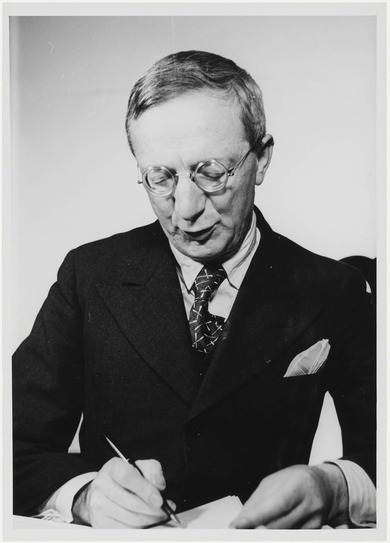Alfred Döblin
Ich kann nach den sieben Jahren [...] resümieren: es war ein lehrreicher Besuch, aber ich bin in diesem Lande, in dem ich und meine Eltern geboren sind, überflüssig und stelle fest, mit jeder erdenklichen Sicherheit: ‚Der Geist, der mir im Busen wohnt, er kann nach außen nichts bewegen.‘
[After seven years I can [...] sum things up: it was an educational visit, but in this country where I and my parents were born I am superfluous and I have discovered with all due certainty that ‘the spirit that lives within my breast cannot do anything to influence what happens on the outside.’ (ed. trans.)]
Alfred Döblin, letter to the President of the Federal Republic of Germany Theodor Heuss, 28 April 1953
| Born | on 10 August 1878 in Stettin, Germany |
|---|---|
| Died | on 26 June 1957 in Emmendingen, Germany |
| Exile | Switzerland, France, Portugal, United States of America |
| Remigration | Federal Republic of Germany, France |
| Profession | Writer |
Alfred Döblin was interested in literature at an early age and already wrote his first novel in his early twenties. He studied medicine and worked as a doctor, but remained true to his writing and was also successful as an author. His most famous work Berlin Alexanderplatz was a worldwide success.
After the Reichstag fire in 1933, Döblin – who was Jewish and had been derogatorily termed an “asphalt writer” by the Nazis – fled to Switzerland so that he could move on to settle in France. From there he wrote polemic works against the Nazi regime. His novels were published by Amsterdam’s Querido publishing house which was established especially for exiled German authors. In 1940 Döblin managed to escape from German troops via Spain and Lisbon finally reaching the USA. After arriving there, he and his family settled in Hollywood and he initially worked as a writer in the film business. Döblin’s period in exile was marked by financial difficulties, especially after he lost his job at the film studio. He was not allowed to work as a doctor in the US and as an author he relied on the “writers’ fund” for support. Döblin also increasingly became an outsider even in the exile community and many friends turned their backs on him when he intimated he was turning to Catholicism on his 65th birthday.
In November 1945, Döblin was one of the first to return to Germany. However, he was never really able to settle again in Germany and, disappointed with post-war Germany, he decided in 1953 to emigrate again, this time to Paris.
Selected works:
Wallenstein (Roman, 1920)
Berlin Alexanderplatz. Die Geschichte vom Franz Biberkopf (Roman, 1929)
November 1918. Eine deutsche Revolution (Erzählwerk in vier Bänden, 1949/1950)
Further reading:
Schoeller, Wilfried F.: Alfred Döblin: Eine Biographie. München: Hanser Verlag 2011
Sander, Gabriele: Alfred Döblin. Stuttgart: Reclam Verlag 2001


